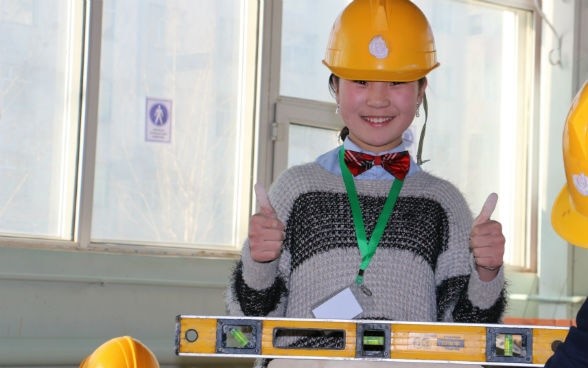Context: By 2018 at least 40,000 additional technical staff will be required in Mongolia’s mineral resource sector and in the upstream and downstream industries, particularly in electrical, construction and mechanical occupations. The training market is currently unable to satisfy this need in terms of either quality or quantity. Young people who have completed their education at state and private vocational schools are frequently unable to find employment due to inadequate qualifications, because in many cases the training provided by vocational schools is not adapted to workplace needs. In this regard, large numbers of young people decide to go on to university rather than take up technical vocational training. At present, there are some 170,000 university students whereas only about 45,000 students are registered at vocational schools.
Implementation of programme/ initiative: Since March 2013 the “Cooperative Vocational Training in the Mineral Resource Sector” (CVT) project has been supporting the Ministry of Labour and Social Protection (MLSP) and selected vocational training facilities in Mongolia to improve formal, technical vocational training and in establish a cooperative approach between the state, the private sector and civil society.
A co-financing arrangement by the Swiss Agency for Development and Cooperation (SDC) makes it possible to extend the action areas to include short-term training and career guidance measures and to expand the project geographically. Additional co-financing by the Australian Government’s Department of Foreign Affairs and Trade (DFAT) supports activities in South Gobi province, including a partnership with an Australian Technical and Further Education (TAFE) Institution. The project is commissioned by the German Federal Ministry for Economic Cooperation and Development (BMZ).
The project initiatives include:
- Supporting the development of competency-based curricula, teaching and learning resources
- Enhancing the qualifications of vocational education and career guidance staff
- Introducing a system of in-company instructors
- Providing advice to the Government on reforming vocational training and career guidance
- Piloting vocational training courses at technician level, short-term qualification measures and vocational guidance services to vocational schools
Main challenges: Mongolia lacks qualification opportunities for job seekers without a formal degree as well as further training for employees and self-employed people. Additionally, young people, as well as adults, rarely have the opportunity to receive high quality career guidance, which would match individual preferences with the needs of the labour market. As a result, they cannot exploit the opportunities of the Mongolian labour market sufficiently.
Since the majority of students in technical vocational training and education programmes at the vocational schools are currently male, special attention is needed to integrate girls and women. Furthermore, the project supports the integration of people with disabilities.
Results achieved: The project has developed new competency based training curricula in the fields of industrial electronics, mechanics and mechatronics, heating/ventilation/air conditioning/plumbing, construction carpentry and masonry, concrete construction, as well as heavy duty machinery repair and operation.
About 560 teachers and representatives from the Mongolian government, school management and companies, as well as other stakeholder organizations, have been trained in Mongolia and at international training centres. They are further trained on-the-job by 12 international technical advisors who are located in CVT’s partner schools.
About 700 students are currently enrolled in study courses supported by the CVT project and 1,400 job seekers have received further qualification through short-term skills training. Fifty-six percent of 630 job seekers surveyed said they had found employment after the training.
Moving Forward: The project has helped to establish a study course for career guidance at Mongolian universities. Furthermore, the project supports the development of a career guidance website (mergejil.mn), which is also available as a mobile phone application.
Based on the experiences from the project’s first phase, the CVT project advises the MLSP in reforming the legislative frameworks of the career guidance and vocational training sectors, in close cooperation with projects funded by the EU and the ADB.
In order to provide vocational education and training with international standards, five vocational schools will become capacity development centres which will provide specialized training in selected trades not just for students but also teachers from other vocational schools as well as further target groups.
Replicability: Curricula have been developed in close cooperation with the industry and are implemented at the CVT’s partner schools. They are used for short-term skills training as well. The CVT project also has supported the schools in procuring technical equipment and teaching and learning materials. Licenses for more than 100 textbooks from internationally renowned publishers have been obtained and the books are currently being translated into Mongolian. The potential for replicability is high in the Asia-Pacific region, if the political will to work closely with industry is present and investment in procuring translated materials is made.
References:
https://www.giz.de/en/worldwide/23143.html
Project Details
Date: October 11, 2017
